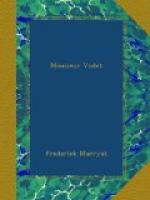Captain Hunt was wise enough to retire without replying, and the next morning the Indians armed with cords and switches, gave a severe whipping to the brigands, for having assumed the Comanche paint and war-whoop. This first part of their punishment being over, their paint was washed off, and the chief passed them over to us, who were, with the addition I have mentioned, now eight white men. “They are too mean,” said the chief, “to receive a warrior’s death; judge them according to your laws; justice must be done.”
It was an awful responsibility; but we judged them according to the laws of the United States and of Texas: they were condemned to be hanged, and at sunset they were executed. For all I know, their bodies may still hang from the lower branches of the three large cotton-wood trees upon the head waters of the Trinity River.
CHAPTER XXVII.
We remained a few days where we were encamped to repose our horses and enable them to support the fatigues of our journey through the rugged and swampy wilderness of North-east Texas. Three days after the execution of the three prisoners, some of our Indians, on their return from a buffalo chase, informed us that several Texan companies, numbering two hundred men, were advancing in our direction, and that probably they were out upon an expedition against the Indians of the Cross Timbers, as they had with them many waggons evidently containing nothing but provisions and ammunition.
We were encamped in a strong position, and of course did not think of retiring. We waited for the Texan army, determined to give them a good drubbing if they dared to attempt to molest us. Notwithstanding the security of our position, we kept a good watch during the night, but nothing happened to give us alarm. The next morning, two hours after sunrise, we saw the little army halting two miles from us, on the opposite shore of a deep stream, which they must necessarily pass to come to us. A company of the Comanches immediately darted forward to dispute the passage; but some flags of truce being displayed by the Texans, five or six of them were allowed to swim over unmolested.
These worthies who came over were Captain Hunt, of whom I have before made mention, and General Smith, commanding the Texan army, who was a certain butcher from Indiana, who had been convicted of having murdered his wife and condemned to be hanged. He had, however, succeeded in escaping from the gaol, and making his way to Texas. The third eminent personage was a Colonel Hookley, and the other two were interpreters. As an Indian will never hurt a foe who comes with a flag of truce, the Comanches brought these gentlemen up to the camp.
As soon as General Smith presented himself before the Comanche chief, he commenced a bullying harangue, not stating for what purpose he had come, telling us gratuitously that he was the greatest general in the land, and that all the other officers were fools; that he had with him an innumerable number of stout and powerful warriors, who had no equal in the world; and thus he went on for half an hour, till, breath failing him, he was obliged to stop.




